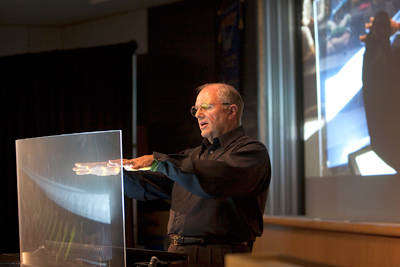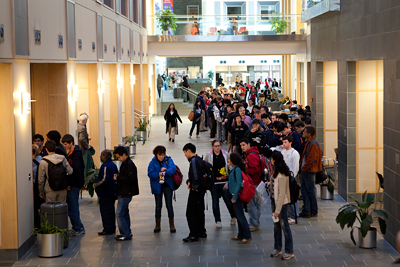We will soon command computers via gesture and voice, says Microsoft's Mundie
By Bill Steele

Move over, Tom Cruise. The hand-waving computer controls depicted in the film "Minority Report" will not be science fiction much longer, according to Craig Mundie, chief research and strategy officer at Microsoft.
And the advent of this "natural interface" will be a watershed that radically changes the way we use computers, a change just as great as the one brought on by the "graphical user interface" -- mousing around the screen instead of typing commands.
"The computer will become much more of a helper for people and not just a tool," Mundie said in a talk at Cornell on campus Nov. 2. Cornell was the first stop on a tour of four colleges, something retired Microsoft CEO Bill Gates used to do every year or so.
Like Gates, Mundie regaled the audience of about 200, mostly students, with demonstrations of new technology, starting with a video of people playing video games simply by waving their hands and kicking their feet. He went on to a live demonstration of the same technology, manipulating images on a computer screen with hand movements. Along with that he demonstrated voice control, using the classic "Star Trek" format: "Computer, display my wind-power simulation."
The hand-waving technology, based on a camera that observes the user in three dimensions, will be on the market in about a year in video game devices, Mundie said, but he added that it will also transform business and home use of computers. Touch screens are already common, he noted, but "When the screen is the size of the wall, you don't want to have to get up and go over and touch it. Hand gestures are a natural way to control things."

In the future, he suggested, the computer will be the room, with 3-D cameras observing your actions and microphones listening for voice commands. And it will be more than a literal follower of instructions. "I want my computer to say, 'I deleted this many e-mails, I answered these using the language you used in answering similar requests, and I saved these for your attention.'" In other words, to do what a human assistant would do.
For scientists and engineers, Mundie said, Microsoft is working on systems that will create computer models without extensive programming. Making computing easier, he argued, will enable more people to work on important problems, such as energy and climate change, without having to become programmers.
All this will be tied in with "the cloud" -- the ability to connect to computing power and data collections distributed across the Internet. "We will add a programming component to the Internet, which up to now has been a publishing medium," Mundie said.
"There never has been as much flux in computing as we're going to see," he concluded.
During the day Mundie met with a panel of faculty members convened by Dan Huttenlocher, dean of computing and information science, as well as groups of students, and held an extended meeting with Fred Schneider, professor of computer science, who is a member of Microsoft's Trustworthy Computing Advisory Board. "We've hardened against traditional attacks," Mundie said earlier in the day. "The advisory board has helped in figuring out what the evolving threats have been and are likely to be."
Media Contact
Get Cornell news delivered right to your inbox.
Subscribe